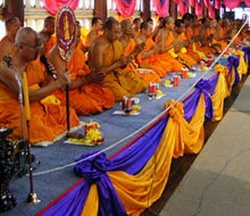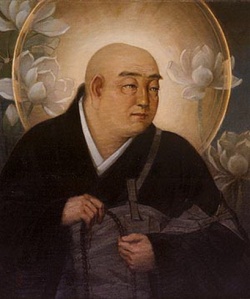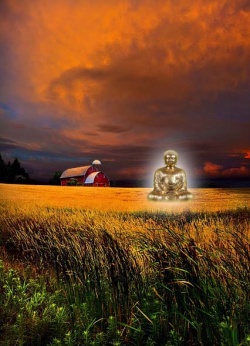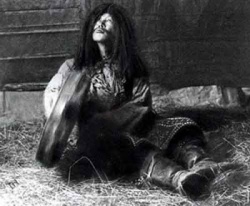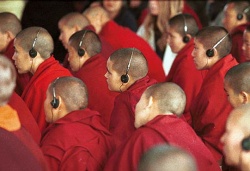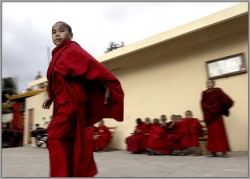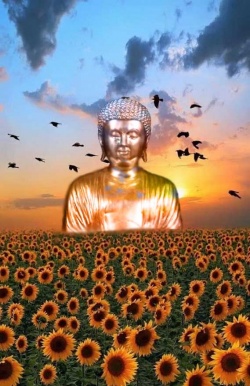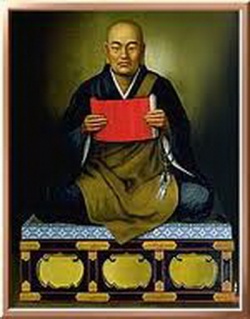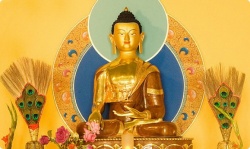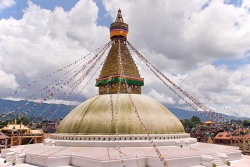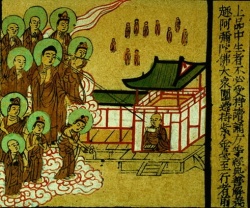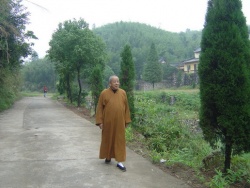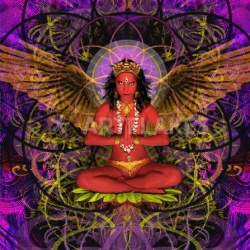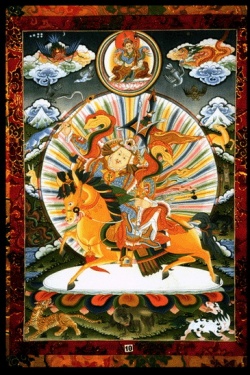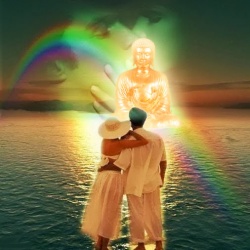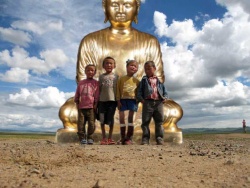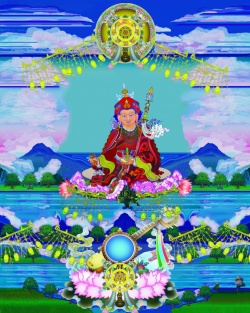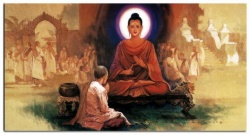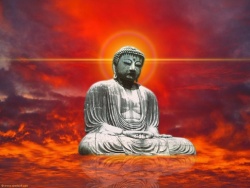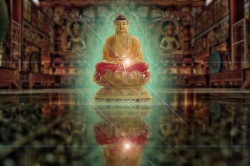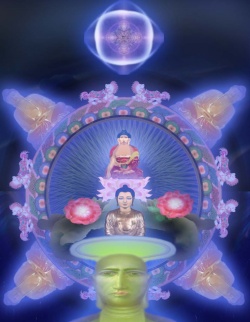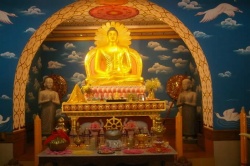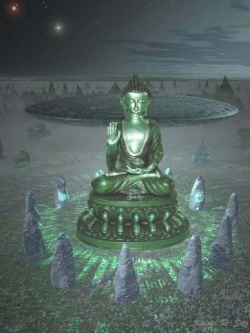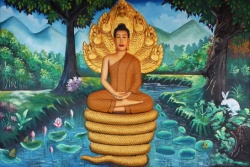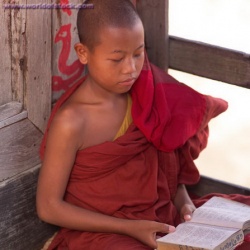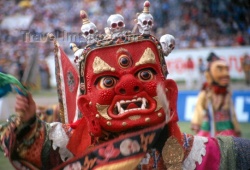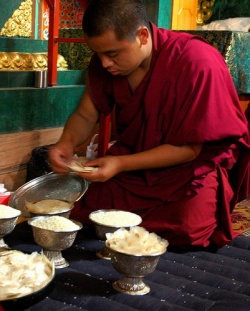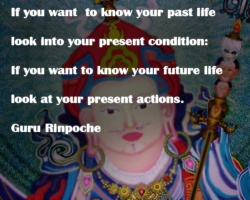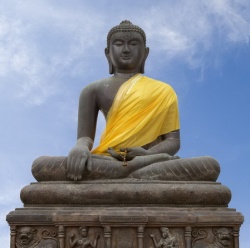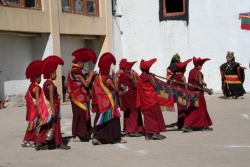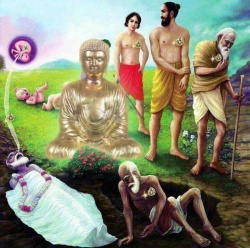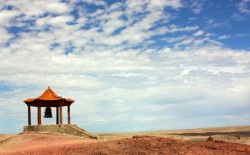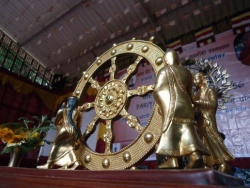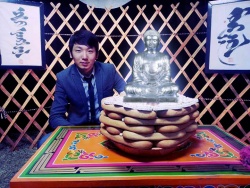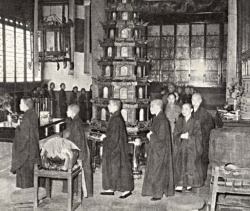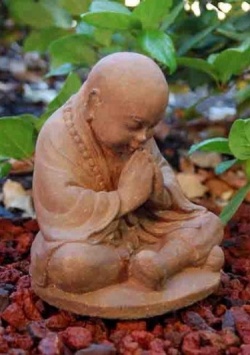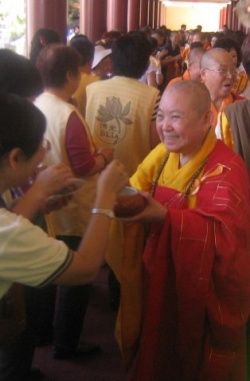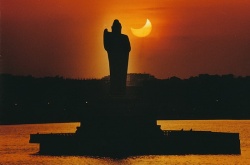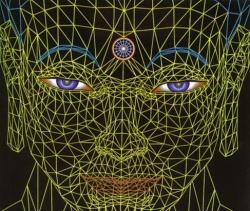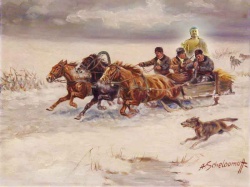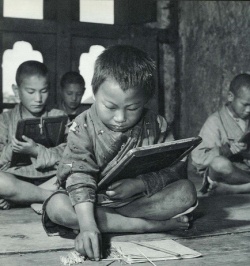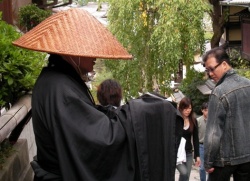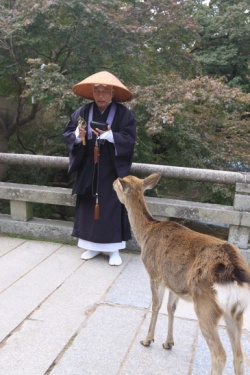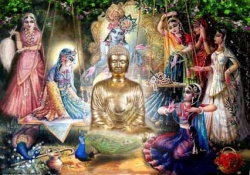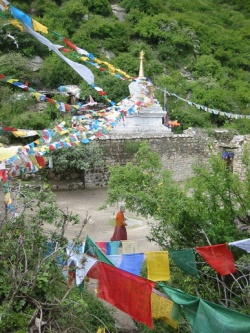Ikeda, Daisaku
Daisaku Ikeda (池田 大作 Ikeda Daisaku?, born January 2, 1928, Japan) is a Buddhist philosopher, educator, author, and anti-nuclear activist.
He served as the third president of the Soka Gakkai, the largest of Japan's new religious movements.
Ikeda is the founding president of the Soka Gakkai International (SGI), the world's largest Buddhist lay organization, with approximately 12 million Nichiren Buddhist practitioners in 192 countries and regions.
Some of the books he has authored, especially The Human Revolution (1965) have gained canonical status within the movement.
In 1996, Los Angeles Times writer Teresa Watanabe described Ikeda as a "puzzle of conflicting perceptions," ranging from "a democrat," "a man of deep learning" and "an inspired teacher," to "a despot," "a threat to democracy" and "Japan's most powerful man."
Watanabe reported that Japanese "tabloid coverage has affected his public image and blurred the lines between suspicion and fact, imagination and reality."
Early life
Ikeda was born the fifth son of seaweed farmers in Ōta, Tokyo. His four older brothers fought in World War II, during which the eldest, Kiichi, was killed in action and his familyʼs home destroyed.
In 1942 at the age of 14, Ikeda worked at munitions factory Niigata Steelworks to support his family. After the war ended in 1945, Ikeda worked for the Shobundo Printing Company.
He graduated from Toyo Trade School in March 1948 and the following month entered the night school extension of Taisei Gakuin (present-day Tokyo Fuji University) where he majored in political science while working for Toda as an editor of a children's magazine, Shonen Nihon (Boy's Life Japan).
Early contact with Soka Gakkai
In August 1947, Ikeda met Josei Toda at a Soka Gakkai discussion meeting and joined the organization that month.
Over the next few years, he worked for various Toda-owned enterprises, particularly Nihon Shogakkan, a publishing house where Ikeda served as editor of a children’s magazine.
Career
Soka Gakkai
Ikeda was a charter member of the Soka Gakkai's Youth Division and appointed a youth division leader in 1953 at the age of 25.
In 1954 he was appointed Soka Gakkai public relations director and named its chief of staff in 1954.:85:77
In 1952, Ikeda witnessed an altercation between Toda and a Nichiren Shōshū priest named Jimon Ogasawara.
During WWII, Ogasawara had cooperated with the militaristic government authorities against Soka Gakkai's founder Tsunesaburō Makiguchi, who had died while imprisoned for his anti-war stance.
On April 28, 1952, Toda led a group of 4,000 Soka Gakkai members to Taiseki-ji, the Nichiren Shōshū head temple, to celebrate the 700th anniversary of the temple’s founding.
While there, Toda confronted Ogasawara, who initially refused to apologize.
Some young men who accompanied Toda tore off Ogasawara’s vestments and tagged him with a placard reading "racoon monk." Toda and Ogasawara later apologized to each other for the incident.
He was then forcibly carried to Makiguchi's grave, where he was made to sign a written apology.:698–711:186:705–711
In April 1957, a group of Young Men’s Division members who were campaigning for a Soka Gakkai electoral candidate were arrested for allegedly distributing money, cigarettes and candies at supporters’ residences.
Ikeda was later arrested in Osaka in his capacity as Soka Gakkai Youth Division Chief of Staff for allegedly overseeing these activities. Ikeda spent two weeks in jail and was cleared of all charges in January 1962.
Ikeda regarded Toda as his spiritual mentor and writes that he influenced him through "the profound compassion that characterized each of his interactions."
Leadership
After Toda's death in 1958, Ikeda succeeded his mentor to become the third president of the Soka Gakkai in 1960, after which he began to travel abroad to expand the Soka Gakkai movement.
The expansion of the Soka Gakkai was, in Ikeda’s words, "Toda’s will for the future."
With his assumption of the Soka Gakkai presidency, Ikeda "continued the task begun by [the Soka Gakkai founder] Makiguchi of fusing the ideas and principles of educational pragmatism with the elements of Buddhist doctrine."
While Soka Gakkai saw its most dramatic growth after the World War II under Toda's leadership, Ikeda led the international growth of the Soka Gakai and turned it into what is considered the largest, most diverse international lay Buddhist association in the world.
He reformed many of the organization's practices including the aggressive conversions (shakubuku (折伏)) the group was known for in Japan and improved the organization's public image, though it was sometimes viewed with suspicion in Japan.
By the 1970s, Ikeda's leadership had expanded the Soka Gakkai into an international lay Buddhist movement increasingly active in peace, cultural and educational activities and shifted the organization away from "a very rigid fundamentalistic and evangelical stance."
For example, on September 17, 1974, Ikeda visited the Soviet Union and met with Premier Aleksey N. Kosygin.
"We must abandon the very idea of war," said Kosygin. "It is meaningless. If we stop preparing for war and prepare instead for peace, we can produce food instead of armaments." He asked Ikeda, "Mr. Ikeda, what is your basic ideology?"
Ikeda replied, "I believe in peace, culture and education – the underlying basis of which is humanism." "I have a high regard for those values,"
Kosygin said. "We need to realize them here in the Soviet Union as well.":415 Ikeda visited with United States Secretary of State Henry Kissinger in 1975 to "urge the de-escalation of nuclear tensions between the United States and the Soviet Union."
In 1975, at an international meeting of Soka Gakkai representatives held in Guam, the Soka Gakkai International (SGI) was formed to support overseas members. Ikeda took a leading role in this development and became founding president of the SGI.:128
Resignation
In 1979, Ikeda resigned as the president of Soka Gakkai, accepting responsibility for the organization's purported deviation from Nichiren Shōshū doctrines and accompanying conflict with the priesthood. Nichiren Shōshū was the Buddhist denomination to which Soka Gakkai had belonged since its founding,
but the relationship between the two was often strained. Hiroshi Hojo succeeded Ikeda as the Soka Gakkai president, and Ikeda remained president of the SGI. Ikeda was also made honorary president of the Soka Gakkai.
Ikeda and the Soka Gakkai were excommunicated by Nichiren Shoshu on November 28, 1991 and on August 11, 1992.
Following the group's excommunication, Soka Gakkai members began to describe their group as Buddhism's first Protestant movement.
Legacy
Under Ikeda's leadership, the SGI has developed as a broad-based grassroots peace movement around the world. He has fostered among SGI members a strong ethos of responsibility for the society with global citizenship spirit.
Accomplishments
Ikeda has founded many global institutions, including Soka University in Tokyo, Japan, and Soka University of America in Aliso Viejo, California; Soka kindergarten, primary and secondary schools in Japan, Korea, Hong Kong, Malaysia, Brazil and Singapore; the Victor Hugo House of Literature,
in France; the International Committee of Artists for Peace in the United States; the Min-On Concert Association in Japan; the Tokyo Fuji Art Museum in Japan; the Institute of Oriental Philosophy in Japan with offices in France, Hong Hong, India, Russia and the United Kingdom;
the Toda Institute for Global Peace and Policy Research in Japan and the United States; and the Ikeda Center for Peace, Learning, and Dialogue in the United States.
Since 1990, Ikeda has partnered with Rabbi Abraham Cooper and the Simon Wiesenthal Center, a Jewish human rights organization, to combat anti-Semitism in Japan.
In a 2001 interview, Rabbi Cooper stated he was "getting nowhere after reaching out to the Japanese media about anti-Semitism in Japan.
The only partners we found to help us bring our concerns to the Japanese public were people from Soka University under the leadership of Daisaku Ikeda.
If you ask me who our best friend in Japan is, who 'gets it,' it is Ikeda. He was actually our first visitor to the Museum of Tolerance."
Their friendship led to the joint development of a Japanese-language Holocaust exhibition The Courage to Remember, which was seen by more than two million people in Japan between 1994 and 2007.
In 2015, a new version of the exhibit opened in Tokyo focusing on the bravery of Anne Frank and Chiune Sugihara.
Ikeda has guided Soka Gakkai's support of, and involvement in, the Komeito, a Japanese political party which, as of 2007, became part of a governing coalition with the Liberal Democratic Party in Japan.
Ikeda was an original proponent of the Earth Charter Initiative, co-founded by Mikhail Gorbachev, and Ikeda has included details of the Charter in many of his annual peace proposals since 1997.
The SGI has supported the Earth Charter with production of global exhibitions including Seeds of Change in 2002 that traveled to 27 nations and Seeds of Hope in 2010, correlating with the Earth Charter-related documentary film, A Quiet Revolution, which the SGI has donated to schools and educational programs around the world.
The traveling exhibition Gandhi, King, Ikeda:
A Legacy of Building Peace showcases the peace activism of Mahatma Gandhi, Martin Luther King Jr, and Daisaku Ikeda.
Lawrence Carter, an ordained Baptist minister and dean of the Martin Luther King Jr. Chapel at Morehouse College in Atlanta, also initiated an annual Gandhi, King, Ikeda Community Builders Prize as a way of extolling individuals whose actions for peace transcend cultural, national and philosophical boundaries.
The United States House of Representatives and individual states including Georgia, Missouri, and Illinois, have passed resolutions that recognize the service and dedication of Daisaku Ikeda "who has dedicated his entire life to building peace and promoting human rights through education and cultural exchange with deep conviction in the shared humanity of our entire global family."
The state of Missouri praised Ikeda and his value of "education and culture as the prerequisites for the creation of true peace in which the dignity and fundamental rights of all people are respected."
In 2014, the City of Chicago named a section of Wabash Avenue in downtown Chicago "Daisaku Ikeda Way", with the Chicago City Council measure passing unanimously, 49 to 0.
In January 2015, the director of the Peace Research Institute Oslo said that Daisaku Ikeda had been nominated for the 2015 Nobel Peace Prize, as confirmed by a Nobel Peace Laureate.
Ikeda is also an honorary member of the Club of Rome.
International initiatives
Ikeda’s meetings with public figures have raised awareness of the SGI’s Buddhist movement in host countries, facilitated relationships with cultural and educational institutions he has founded, and lent support, for example, to SGI-sponsored traveling exhibits on global issues.
These meetings and relationships have been described by some as citizen diplomacy for their contributions to diplomatic as well as intercultural ties between Japan and other countries.
Coverage in SGI publications suggests Ikeda's meetings and dialogues illustrate the SGI movement’s commitment to peace, environmental concerns and humanitarianism.
Observers suggest the body of literature chronicling Ikeda’s more than 7,000 dialogues provides SGI members with a personal education and model of citizen diplomacy and, from a scholarly view, represents “a new current in interculturalism and educational philosophy.”
Ikeda’s first meeting with Nelson Mandela in 1990 led to SGI-sponsored anti-apartheid lectures, a traveling exhibit and student exchanges at the university level.
American Civil Rights pioneer Rosa Parks chose as her favorite photograph one of her meeting with Ikeda in 1993. She explained that:
I can’t think of a more important moment in my life. ... [Ikeda] said this meeting, between the two of us, was very special for him. It was for me, too. In his concern for human rights, Dr. Ikeda is ahead of many people in this century.
He is a calm spirit, a humble man, a man of great spiritual enlightenment. We met for about an hour and talked about my life and challenges concerning the youth in our countries. ...
Our meeting can serve as a model for anyone. So the photograph of our first meeting is very important because it is history in the making.
Sino-Japanese relations
Ikeda made several visits to China and met with Chinese Premier Zhou Enlai in 1974. The visits led to the establishment of cultural exchanges of art, dance and music between China and Japan and opened academic exchanges between Chinese educational institutions and Soka University.
Chinese media describe Ikeda as an early proponent of normalizing diplomatic relations between China and Japan in the 1970s, citing his 1968 proposal that drew condemnation by some and the interest of others including Zhou Enlai.
It was said that Zhou Enlai entrusted Ikeda with ensuring that "Sino-Japanese friendship would continue for generations to come."
Since 1975 cultural exchanges have continued between the Min-On Concert Association, founded by Ikeda, and institutions including the Chinese People’s Association for Friendship with Foreign Countries.
After Ikeda’s 1984 visit to China and meetings with public figures including Chinese Communist Party Leader Hu Yaobang and Deng Yingchao, an observer estimated that Ikeda’s 1968 proposal may have contributed to Japanese public sentiment on closer diplomatic ties with China and this cultivation of educational and cultural ties helped strengthen state relations.
Honorary doctorates and professorships
Ikeda received his 300th academic honor from the University of Massachusetts Boston on November 21, 2010.
He has said that "The academic honors I have accepted have all been on behalf of the members of SGI around the world."
[show]Number Country Institution Title conferred Place and date
Other awards
United Nations Peace Award (1983, USA)[113][114]
Rosa Parks Humanitarian Award (1993, USA)[115][116]
International Tolerance Award from the Simon Wiesenthal Center (1993, Los Angeles, Calif.)[114][116]
Tagore Peace Award (1997, India)[117]
Rizal International Peace Award (1998, the Philippines) from the Knights of Rizal[118]
International Literary Award for Understanding and Friendship (2003, Beijing, China) from the China Literature Foundation and Chinese Writersʼ Association [119]
Jamnalal Bajaj Award (2005, India) for "Outstanding Contribution in Promotion of Gandhian Values Outside India by Individuals other than Indian Citizens"[120]
Order of Friendship (2008, Russia)[121]
Gold Medal for Peace with Justice from the Sydney Peace Foundation (2009, Australia)[122][123]
Indology Award (2011, India) for “outstanding contribution in the field of Indic research and Oriental wisdom” from Motilal Banarsidass Publishers[124]
Golden Heart Award (2012, the Philippines) from the Knights of Rizal [125]
Gandhi International Prize for Social Responsibility (2014, Australia)[126]
Personal life
Ikeda lives in Tokyo with his wife, Kaneko (born 1932), whom he married on May 3, 1952. He has three sons, Hiromasa (born 1953; vice president of Soka Gakkai),[127] Shirohisa (1955–1984), and Takahiro (born 1958).
Criticism
The Soka Gakkai movement has been characterized as being centered on a cult of personality around Ikeda.[128][129][130][131][132]
In 1984, British journalist and political commentator Polly Toynbee visited Ikeda at the invitation of the SGI.
According to Peter Popham, writing about Tokyo architecture and culture, Ikeda "was hoping to tighten the public connection between himself and Polly Toynbee's famous grandfather, Arnold Toynbee, the prophet of the rise of the East."
Polly Toynbeee wrote that she had never met "anyone who exudes such an aura of absolute power as Mr. Ikeda" and others she had talked to “felt they had been drawn into endorsing [Ikeda].”
In The Guardian in May 1984, she wrote that she wished that her grandfather had not endorsed Choose Life: A Dialogue, his dialogue with Ikeda.[135]
In 1995, Michelle Magee wrote an article in the San Francisco Chronicle titled "Japan Fears Another Religious Sect" in which she said the Soka Gakkai in Japan had been accused of "heavy-handed fund raising and proselytizing, as well as intimidating its foes and trying to grab political power".[136] The article quoted Takashi Shokei,
a professor at Meisei University, who called Ikeda "a power-hungry individual who intends to take control of the government and make Soka Gakkai the national religion;" the article also described a videotape made by a disgruntled former Soka Gakkai member in 1993 purportedly showing Ikeda
"yelling and pounding on tables in anger and later railing against President Clinton for having refused to meet with him".[136]
In 1995, a Japanese edition of Time carried an article critical of Daisaku Ikeda and Soka Gakkai, claiming that "according to a member who was present" Ikeda, as "honorary president and unquestioned commander" of Soka Gakkai, had said of the Japanese political party Komeito:
"This time, not the next time, [the election] is going to be about winning or losing. We cannot hesitate. We must conquer the country with one stroke."[citation needed]
In 1999, Howard French wrote a critical article in the The New York Times about the rise of the New Komeito Party in Japan and its ties to Ikeda and the Soka Gakkai. In response, a letter to the editor by Alfred Balitzer offered a more positive portrayal of Komeito and Soka Gakkai.[137]
Ikeda held multiple meetings with former Panamanian dictator Manuel Noriega. Noriega repeatedly visited Taiseki-ji and hosted Ikeda on several visits to Panama. Both leaders praised each other's virtues in public statements.
160 After a 1981 visit, Noriega named a scenic observation point on one of the Causeway Islands at the Pacific approach to the Panama Canal "Mirador Ikeda," and he presented Ikeda with the Order of Vasco Núñez de Balboa.
Friends of Noriega and anonymous American sources have alleged that Ikeda provided him with several million dollars' worth of assistance during the worst part of Noriega's crisis in 1987 and 1988, though Soka Gakkai spokesmen have repeatedly denied this.[140][141]
Ikeda also held meetings with Romanian General Secretary Nicolae Ceaușescu.
Books
Ikeda is a prolific writer, peace activist and interpreter of Nichiren Buddhism.[142] His interests in photography, art, philosophy, poetry and music are reflected in his published works.
In his essay collections and dialogues with political, cultural, and educational figures he discusses, among other topics: the transformative value of religion, the universal sanctity of life, social responsibility, and sustainable progress and development.
The 1976 publication of Choose Life: A Dialogue (in Japanese, Nijusseiki e no taiga) is the published record of dialogues and correspondences that began in 1971 between Ikeda and British historian Arnold J. Toynbee about the “convergence of East and West”
on contemporary as well as perennial topics ranging from the human condition to the role of religion and the future of human civilization.
Toynbee’s 12-volume A Study of History had been translated into Japanese, which along with his lecture tours and periodical articles about social, moral and religious issues gained him popularity in Japan. To an expat’s letter critical of Toynbee’s association with Ikeda and Soka Gakkai, Toynbee wrote back:
“I agree with Soka Gakkai on religion as the most important thing in human life, and on opposition to militarism and war."[145] To another letter critical of Ikeda, Toynbee responded:
“Mr. Ikeda’s personality is strong and dynamic and such characters are often controversial.
My own feeling for Mr. Ikeda is one of great respect and sympathy.” As of 2012, the book had been translated and published in twenty-six languages.
Ikeda’s children’s stories are “widely read and acclaimed,” according to The Hindu, which reported that an anime series of 14 of the stories was to be shown on the National Geographic Channel.[148][149] In the Philippines, DVD sets of 17 of the animated stories were donated by Anak TV to a large school, as part of a nationwide literacy effort.
In 2003, Japan’s largest English-language newspaper, The Japan Times, began carrying periodic essays by Ikeda on global issues including peacebuilding, nuclear disarmament, and compassion.
As of 2015, The Japan Times had published 26 essays by Ikeda, 15 of which were also published in a bilingual Japanese-English book titled “Embracing the Future.”
Human Revolution
Ikeda's most well-known publication is the novel The Human Revolution (Ningen Kakumei), which was serialized in the Soka Gakkai's daily newspaper, the Seikyo Shimbun. In his preface to The Human Revolution, the author describes the book as a “novelized biography of my mentor, Josei Toda.” :
vii The author's official website, daisakuikeda.org, describes the book as an "historical novel [that] portrays the development of the Soka Gakkai in Japan, from its rebirth in the post-World War II era to the last years of its second president, Josei Toda."
In 1978, as the Gakkai entered a dispute with Nichiren Shoshu, the text of Human Revolution was altered in over 40 places.
The author writes that "the original narrative has been edited to bring it into line with recent developments in the history of Nichiren Buddhism, with changes and deletions in the presentation of the material" in the preface to the 2004 edition of The Human Revolution.[153]:x
Selected works
A Dialogue Between East and West: Looking to a Human Revolution (Echoes and Reflections: The Selected Works of Daisaku Ikeda) with Ricardo Diez-Hochleitner, London and New York: I. B. Tauris, 2008; ISBN 978-1845116002 (Hardback), ISBN 978-1845116002 (Paperback)
A Lifelong Quest for Peace with Linus Pauling (May 2000), Jones and Bartlett Publishers, 1st edition, ISBN 978-0867202786 (Hardback), ISBN 0-86720-277-7 (Paperback); London and New York: I. B. Tauris, Reprint edition 2008; ISBN 978-1845118891
A Passage to Peace: Global Solutions from East and West with Nur Yalman, London and New York: I. B. Tauris, 2009; ISBN 9781845119225 (Hardback), ISBN 9781845119232 (Paperback)
A Quest for Global Peace: Rotblat and Ikeda on War, Ethics, and the Nuclear Threat with Joseph Rotblat, London and New York: I. B. Tauris, 2006; ISBN 978-1845112790
A Youthful Diary: One Man's Journey from the Beginning of Faith to Worldwide Leadership for Peace, Santa Monica, California: World Tribune Press, 2006; ISBN 978-1932911190
America Will Be!: Conversations on Hope, Freedom, and Democracy, with Vincent Harding, Cambridge, Massachusetts: Dialogue Path Press, 2013; ISBN 978-1887917100
Before It Is Too Late with Aurelio Peccei, (1985), Kodansha America, 1st edition, ISBN 978-0870117008; London and New York: I. B. Tauris Reprint edition, 2008; ISBN 978-1845118884
Buddhism: A Way of Values" with Lokesh Chandra, New Delhi: Eternal Ganges Press, 2009; ISBN 978-81-907191-2-4
Buddhism: the First Millennium, (1977), Kodansha International, ISBN 9780870113215 (Hardback); Santa Monica, California: Middleway Press, Reprint edition, 2009; ISBN 978-0977924530
Choose Hope: Your Role in Waging Peace in the Nuclear Age with David Krieger, Santa Monica, California: Middleway Press, 2002; ISBN 0-967-46976-7
Choose Life: A Dialogue with Arnold J. Toynbee, Richard L. Gage (Editor), (1976), Oxford University Press, ISBN 978-0192152589; London and New York: I. B. Tauris, Reprint edition, 2008; ISBN 978-1845115951
Choose Peace: A Dialogue Between Johan Galtung and Daisaku Ikeda with Johan Galtung, London: Pluto Press, 1999; ISBN 978-0745310404
Compassionate Light in Asia with Jin Yong, London and New York: I. B. Tauris, 2013; ISBN 978-1848851986
Creating Waldens: An East-West Conversation on the American Renaissance with Ronald A. Bosco and Joel Myerson, Cambridge, Massachusetts: Dialogue Path Press, 2009; ISBN 978-1887917070
Dawn After Dark with René Huyghe, (1991), Weatherhill, ISBN 9780834802384; London and New York: I. B. Tauris, Reprint edition, 2008; ISBN 978-1845115968
Dialogue of World Citizens with Norman Cousins, (tentative translation from Japanese), Sekai shimin no taiwa, 世界市民の対話, Paperback edition, Tokyo, Japan: Seikyo Shimbunsha, 2000; ISBN 978-4412010772
Discussions on Youth, Santa Monica, California: World Tribune Press, 2010; ISBN 978-1-932911-93-0
Embracing the Future, Tokyo: The Japan Times, 2008; ISBN 978-4-7890-1316-1
Fighting for Peace, Berkeley, California: Creative Arts Book Company, 2004; ISBN 0-88739-618-6
For the Sake of Peace: A Buddhist Perspective for the 21st Century, Santa Monica, California: Middleway Press, 2001; ISBN 978-0967469720
Glass Children and Other Essays, Tokyo: Kodansha International, 1979; ISBN 0-87011-375-5
Global Civilization: A Buddhist-Islamic Dialogue With Majid Tehranian, London and New York: I. B. Tauris, 2008; ISBN 978-1860648106
Human Rights on the 21st Century with Austregesilo de Athayde, London and New York: I. B. Tauris, 2009; ISBN 978-1845119881
Human Values in a Changing World: A Dialogue on the Social Role of Religion, with Bryan Wilson. Reprint edition. London and New York: I. B. Tauris, 2008; ISBN 978-1845115975
Humanity at the Crossroads: An Intercultural Dialogue with Karan Singh, New Delhi: Oxford University Press India, 1988; ISBN 978-0195622157
Into Full Flower: Making Peace Cultures Happen with Elise Boulding, Cambridge, Massachusetts: Dialogue Path Press, 2010; ISBN 978-1887917087
Journey of Life: Selected Poems of Daisaku Ikeda, London and New York: I. B. Tauris, 2014; ISBN 9781780769691
Kanta and the Deer (children's book), New York: Weatherhill, 1997; ISBN 978-0834804067
'La fuerza de la Esperanza; Reflexiones sobre la paz y los derechos humanos en el tercer milenio' (dialogue between Argentine Nobel Peace laureate Dr. Adolfo Pérez Esquivel and Daisaku Ikeda), Buenos Aires: Emecé Editores,2011; ISBN 9789500434126
Life: An Enigma, a Precious Jewel, 1st edition, New York: Kodansha America, 1982; ISBN 978-0870114335
Moral Lessons of the Twentieth Century: Gorbachev and Ikeda on Buddhism and Communism with Mikhail Gorbachev, London and New York: I. B. Tauris, 2005; ISBN 9781845117733
My Recollections, Santa Monica, California: World Tribune Press, 1980; ISBN 978-0915678105
New Horizons in Eastern Humanism Buddhism, Confucianism and the Quest for Global Peace with Tu Weiming, London and New York: I. B. Tauris, 2011; ISBN 978-1-84885-593-9
Ode to the Grand Spirit: A dialogue Ode to the Grand Spirit: A Dialogue (Echoes and Reflections)" — with Chingiz Aitmatov, London and New York: I. B. Tauris, 2009; ISBN 978-1-84511-987-4
On Being Human: Where Ethics, Medicine, and Spirituality Converge with René Simard and Guy Bourgeault, Santa Monica, California: Middleway Press, 2003; ISBN 0-9723267-1-5
On Peace, Life and Philosophy with Henry Kissinger (tentative translation from Japanese), Heiwa to jinsei to tetsugaku o kataru,「平和」と「人生」と「哲学」を語る, Tokyo, Japan: Ushio Shuppansha, 1987; ISBN 978-4267011641
One by One: The World is Yours to Change, Sonoma, California: Dunhill Publishing; Paper/DVD edition, 2004; ISBN 978-1931501019
Over the Deep Blue Sea (children's book), Brian Wildsmith (Illustrator), New York: Alfred A. Knopf, 1993, ISBN 978-0679841845
Planetary Citizenship: Your Values, Beliefs and Actions Can Shape A Sustainable World with Hazel Henderson, Santa Monica, California: Middleway Press, 2004; ISBN 0972326723/ISBN 978-0972326728
Rendezvous with nature: songsof peace / photographs by Daisaku Ikeda, Shizen to no taiwa: heiwa no shi, 自然との対話 平和の詩, Tokyo: Soka Gakkai, 2005; OCLC Number: 73228297
Revolutions to Green the Environment, to Grow the Human Heart: A Dialogue Between M.S. Swaminathan, Leader of the Ever-Green Revolution and Daisaku Ikeda, Proponent of the Human Revolution, Madras, India: East West Books, 2005; ISBN 978-8188661343
Search for a New Humanity: A Dialogue with Josef Derbolav, London and New York: I. B. Tauris, 2008; ISBN 978-1-84511-598-2
Soka Education: A Buddhist Vision for Teachers, Students and Parents, Santa Monica, California: Middleway Press, 2001; ISBN 0-9674697-4-0
Songs from My Heart, (1978), Weatherhill, ISBN 0-8348-0398-4, New York and Tokyo: Weatherhill, Reprint edition 1997; ISBN 0-8348-0398-4
Space and Eternal Life with Chandra Wickramasinghe, Newburyport, Massachusetts: Journeyman Press, 1998; ISBN 1-85172-060-X
The Cherry Tree (children's book), Brian Wildsmith (Illustrator), New York: Knopf Books for Young Readers, 1992; ISBN 978-0679826699
The Flower of Chinese Buddhism, Santa Monica, California: Middleway Press, 2009; ISBN 978-0977924547
The Human Revolution (The Human Revolution, #1-12), abridged two-book set, Santa Monica, California: World Tribune Press, 2008; ISBN 0-915678-77-2
The Inner Philosopher: Conversations on Philosophy’s Transformative Power with Lou Marinoff, Cambridge, Massachusetts: Dialogue Path Press, 2012; ISBN 978-1887917094
The Living Buddha: An Interpretive Biography, Santa Monica, California: Middleway Press, 2008; ISBN 978-0977924523
The New Human Revolution (an ongoing series) (30+ Volumes, this is an ongoing series), Santa Monica, California: World Tribune Press, 1995-; partial list of ISBN Vol.1 978-0-915678-33-4, Vol.2 978-0-915678-34-1, Vol.3 978-0-915678-35-8, Vol.4 978-0-915678-36-5, Vol.5 978-0-915678-37-2, Vol.6 978-0-915678-38-9, Vol.7 978-0-915678-39-6, Vol.8 978-0-915678-40-2, Vol.9 978-0-915678-41-9, Vol.10 978-0-915678-42-6, Vol.11 978-0-915678-43-3, Vol.12 978-0-915678-44-0, Vol.13 978-0-915678-45-7, Vol.14 978-0-915678-46-4, Vol.15 978-0-915678-47-1, Vol.16 978-0-915678-48-8, Vol.17 978-0-915678-49-5, Vol.18 978-0-915678-50-1, Vol.19 978-0-915678-51-8, Vol.20 978-0-915678-52-5, Vol.21 978-0-915678-53-2, Vol.22 978-0-915678-54-9, Vol.23 978-0-915678-55-6, Vol.24 978-0-915678-56-3
The Persistence of Religion: Comparative Perspectives on Modern Spirituality with Harvey Cox, London and New York: I. B. Tauris, 2009; ISBN 9781848851955 (Paperback), ISBN 9781848851948 (Hardback)
The Princess and the Moon (children's book), Brian Wildsmith (Illustrator), New York: Knopf Books for Young Readers, 1992; ISBN 978-0679836209
The Snow Country Prince (children's book), Brian Wildsmith (Illustrator), New York: Knopf Books for Young Readers, 1991; ISBN 978-0679919650
The Way of Youth: Buddhist Common Sense for Handling Life's Questions (with a foreword by Duncan Sheik), Santa Monica, California: Middleway Press, 2000, ISBN 9780967469706
The Wisdom of the Lotus Sutra (6 volumes), Santa Monica, California: World Tribune Press, 2000 (vols 1 & 2), 2001 (vol 3), 2002 (vol 4), 2003 (vols 5 & 6); ISBN 0-915678-69-1 (vol 1), 0-915678-70-5 (vol 2), 0-9-15678-71-3 (vol 3), 0-915678-72-1 (vol 4), 0-915678-73-X (vol 5), 0-915678-74-8 (vol 6)
Toward Creating an Age of Humanism with John Kenneth Galbraith (tentative translation from Japanese), Ningenshugi no dai seiki o, 人間主義の大世紀を―わが人生を飾れ, Tokyo, Japan: Ushio Shuppansha, 2005; ISBN 978-4267017308
Unlocking the Mysteries of Birth and Death: A Buddhist View of Life, 2nd edition, Santa Monica, California: Middleway Press, 2004; ISBN 978-0972326704
Notes
In Japanese folklore, the tanuki or Japanese raccoon dog is regarded as a sly and deceptive being with shapeshifting powers. The word is still used in contemporary Japanese to refer to slyness and deception. See the definition of tanuki in Kōjien (2nd ed.): 他人を欺くこと。また、そのひと。
References
"Daisaku Ikeda Profile". Soka University. Retrieved 22 February 2013.
Dayle Bethel (1974). "The Political Ideology of Ikeda Daisaku, President of Soka Gakkai". International Education 3 (2).
Jason Goulath; Takao Ito (2012). "Daisaku Ikeda's Cirriculum of Soka Education: Creating Value Through Dialogue, Global Citizenship, and 'Human Education' in the Mentor-Disciple Relationship". Curriculum Inquiry 42 (1).
Editor (3 February 2015). "No More Nukes". Tricycle. Retrieved 19 February 2015.
Daniel Métraux (2013). "Soka Gakkai International: Japanese Buddhism on a Global Scale". Virginia Review of Asian Studies.
Clark Strand (Winter 2008). "Faith in Revolution". Triycle. Retrieved 19 February 2015.
Watanabe, Teresa (15 March 1996). "Japan's Crusader or Corrupter?". Los Angeles Times. Retrieved 3 December 2013.
Ikeda, Daisaku (May 11, 1998). "My Mother". The Mirror Weekly(The Philippines).
M. LaVora Perry (2010). PeaceBuilders--Daisaku Ikeda & Josei Toda, Buddhist Leaders. Fortune Child Books. ISBN 978-0977111312.
Timeline of Ikeda's life, daisakuikeda.org. Accessed 6 November 2013.
Seager, Richard Hughes. Encountering the Dharma: Daisaku Ikeda, Soka Gakkai, and the Globalization of Buddhist Humanism. Berkeley, Los Angeles, London: University of California Press, 2006.
Kisala, Robert (2000). Prophets of peace: Pacifism and cultural identity in Japan's new religions. Honolulu, HI, USA: University of Hawai'i Press. ISBN 978-0824822675.
Montgomery, Daniel B. (1991). Fire in the lotus: the dynamic Buddhism of Nichiren. London: Mandala. ISBN 978-1852740917, Page 187
Murata, Kiyoaki (1969). Japan's new Buddhism: an objective account of Soka Gakkai. New York: Weatherhill. pp. 96–97. ISBN 978-0834800403.
Shimada, Hiromi (2008). Sōkagakkai (Kindle) (in Japanese). Tokyo: Shinchōsha. ISBN 978-4106100727.
Montgomery, Daniel B. (1991). Fire in the lotus: the dynamic Buddhism of Nichiren. London: Mandala. ISBN 978-1852740917.
Murata, Japan's New Buddhism: "Recalling this incident in an interview with the author in July 1956, Toda admitted hitting the priest "twice" and said that this was the cause of the extremely unfavorable press his organization then received. . . ."
"SŌKA GAKKAI". Virginia Commonwealth University. Archived from the original on 12 May 2014. Retrieved 19 February 2015.
Ikeda, Daisaku. "Thoughts on Education for Global Citizenship" (daisakuikeda.org). Teachers College, Columbia University, June 13, 1996
Ronan Alves Pereira (2008). "The transplantation of Soka Gakkai to Brazil: building "the closest organization to the heart of Ikeda-Sensei"". Japanese Journal of Religious Study.
Daisaku Ikeda. The New Human Revolution 1. World Tribune Press.
Daniel Métraux (2013). "Soka Gakkai International: The Global Expansion of a Japanese Buddhist Movement". Religion Compass.
Choy, Lee Khoon (1995). Japan, between myth and reality. Singapore [u.a.]: World Scientific. ISBN 981-02-1865-6.
Lewis, James R. (2003). Legitimating new religions ([Online-Ausg.]. ed.). New Brunswick, N.J.: Rutgers University Press. ISBN 978-0813533247. "Soka Gakkai ... was not infrequently stereotyped as a brainwashing cult, particularly by anti-cult authors."
Fujiwara, Hirotatsu (1970). I Denounce Soka Gakkai. Tokyo: Nisshin Hodo. ISBN 9110135502.
Furukawa, Toshiaki (2000). Karuto to shite no Sōka Gakkai = Ikeda Daisaku (Shohan. ed.). Tokyo: Daisan Shokan. ISBN 978-4807400171.
Yanatori, Mitsuyoshi (1977). Sōka Gakkai (in Japanese). Tokyo: Kokusho Kankōkai.
Queen, Christopher S. and Sallie B. King, eds. (1996). Engaged Buddhism: Buddhist Liberation Movements in Asia. Albany: State University of New York Press. p. 365. ISBN 0791428443.
http://www.daisakuikeda.org/main/peacebuild/friends/aleksey-n-kosygin.html Aleksey N. Kosygin—Advocate of Peace in the Midst of the Cold War
https://books.google.com/books?id=umep6P6dYLAC&dq=Lebron+common&source=gbs_navlinks_s Searching for Spiritual Unity...Can There Be Common Ground? By Robyn E. Lebron
http://www.sgiquarterly.org/borders2009Apr-1.html Russia--Cultivating the Common Ground of Peace
Shimada, Hiromi: Kōmeitō vs. Sōka Gakkai ("Conflicts between Komeito and Soka Gakkai"). Asahi Shinsho, Tokyo: May 2007. ISBN 978-4-02-273153-1. p. 114. (Japanese)
Shimada, Hiromi: Kōmeitō vs. Sōka Gakkai, p. 116. (Japanese)
Timeline of Ikeda's life, daisakuikeda.org
Strand, Clark, "Waking the Buddha", Middleway Press, 2014. ISBN 978-0-9779245-6-1. pp. 149-150
Métraux, Daniel A., "The Dispute Between the Soka Gakkai and the Nichiren Shoshu Priesthood: A Lay Revolution Against a Conservative Clergy", Japanese Journal of Religious Studies, 1992, 19/4, pp. 328 and 330
Wilson, Bryan and Dobbelaere, Kareland, "A Time to Chant: The Soka Gakkai Buddhists in Britain", Clarendon Press, 1994. ISBN 978-0-19-827915-0. p. 240
Mizoguchi, Atsushi: Ikeda Daisaku: Kenryokusha no Kōzō ("Daisaku Ikeda: The structure behind a man with power"). Tokyo: Kōdansha, 2005. ISBN 4-06-256962-0. p. 396 (Japanese)
Taisekiji: Nichiren Shōshū Nyūmon ("An introduction to Nichiren Shōshū"). Fujinomiya, 2002. p. 332 (chronology) and p. 240 (Japanese)
Howard W. French, "A Sect's Political Rise Creates Uneasiness in Japan", 14 November 1999. Accessed 19 November 2011.
Jacqueline I. Stone, "Nichiren's activist heirs: Sōka Gakkai, Risshō Kōsekai, Nipponzan Myōhōji", in Christopher Queen, et al., eds, Action Dharma: New Studies in Engaged Buddhism (London: Routledge Curzon, 2003). Scan (PDF) available here .
Goulah, Jason. 2010. “Daisaku Ikeda’s Environmental Ethics of Humanitarian Competition: A Review of His United Nations Peace and Education Proposals.” Peace Studies Journal 3:1 (April 2010). Central New York Peace Studies Consortium. p3. ISSN: 21510806
"Major Holocaust Exhibit in Japan on Righteous Gentile Chiune Sugihara". Jewish Community of Lithuania. Retrieved 21 October 2015.
Rockefeller, Steven C. “Ethics & the Earth Charter” Interview. Accessed August 29, 2014.
"The Heart of the Matter: Infusing Sustainability Values in Education" (PDF). Earth Charter Center. Retrieved 21 October 2015.
Rautenstraus, Kent. "Dean Lawrence Carter Communes with Mystics: from Gandhi to King to Ikeda to Holmes" (PDF). Science of Mind (June 2013): 20. Retrieved 30 July 2014.
"Morehouse College Martin Luther King Jr. International Chapel: Dean of the Chapel". Morehouse College. Retrieved 30 July 2014.
CONGRESS 1ST SESSION H. RES. 844, Recognizing the service and dedication of Dr. Daisaku Ikeda and celebrating his 80th birthday, 110TH, the House of Representatives, State of Illinois, December 5, 2007
E103 CONGRESSIONAL RECORD, the House of Representatives, State of Georgia; January 15, 2009
House Resolution No. 0620C.01, the state of Missouri grant an exceptional honor, the House of Representatives, State of Missouri, 2004
Bill Status of HR0791, Illinois General Assembly, State of Illinois, October 24, 2007
Bill Status of HR0797, Illinois General Assembly, State of Illinois, December 23, 2009
"Office of the City Clerk: Legislative Information Center". Chicago Legistar. Retrieved 10 August 2015.
"Nobel Peace Prize 2015: PRIO Director's Speculations". PRIO. Retrieved 10 August 2015.
list of honorary members, Club of Rome.
Seager, Richard Hughes. 2006. Encountering the Dharma: Daisaku Ikeda, Soka Gakkai, and the Globalization of Buddhist Humanism. Berkeley/Los Angeles/London: University of California Press. p120. ISBN 0520245776
Métraux, Daniel A. 1994. The Soka Gakkai Revolution. Lanham/New York/London: University Press of America. p126. ISBN 0819197335
Indangasi, Henry. Preface. In Indangasi, Henry and Odari, Masumi, eds. 2001. Daisaku Ikeda and Africa: Reflections by Kenyan Writers. Nairobi, Kenya: University of Nairobi Press. pxiii. ISBN 9966-846-49-2.
Seager 2006, p119.
Dobbelaere, Karel. “Toward a Pillar Organization?” In Machacek, David and Wilson, Bryan. 2000. Global Citizens: The Soka Gakkai Buddhist Movement in the World. p252. ISBN 0199240396
Goulah, Jason. “Dialogic Practice in Education.” In Urbain, Olivier. 2013. Daisaku Ikeda and Dialogue for Peace. London/New York: I.B. Tauris. p83. ISBN 9781780765723
Metraux 1994, p171.
Seager 2006, p121.
Goulah, Jason. 2012. “Daisaku Ikeda and Value-Creative Dialogue: A new current in interculturalism and educational philosophy.” Educational Philosophy and Theory 44:9 (November 2013). Publisher: Philosophy of Education Society of Australasia. p997-1009. doi: 10.1111/j.1469-5812.2011.00827.x. Accessed June 15, 2014.
Seager 2006, p120.
Kismaric, Carole and Heiferman, Marvin. Talking Pictures: People Speak about the Photographs that Speak to Them. San Francisco: Chronicle Books, 1994. ISBN 978-0-8118-0382-3. Pp. 198–199
Chong Zi and Qin Jize, “Praise for man that called for friendship”. China Daily. May 9, 2008. p3.
“Ikeda was strongly criticized and even received death threats from right-wingers. Ikeda saw peace with China as fundamental to the stability of Asia, and considered the reintegration of China into the international community as vital to world peace. His call and behind-the-scenes efforts helped establish the groundwork for a series of political-level exchanges between China and Japan, culminating in the restoration of diplomatic relations in 1972." Excerpted from Cai Hong, “Books to connect cultures." China Daily. July 4, 2012.
南开大学周恩来研究中心 (Zhou Enlai Research Center, Nankai University). 2001. 周恩来与池田大作 (Zhou Enlai and Daisaku Ikeda). 主编王永祥 (Edited by Wang Yongxian). Beijing, China: 中央文献出版社 (Central Literature Publishing House). p2. ISBN 7-5073-0973-8.
Gan Xianyi. 2013. “Min-On Folk Arts Group’s Performance Tour of China.” 7 November. CPAFFC. Accessed June 14, 2014.
Gao Hui. 2012. “Shaanxi Song and Dance Troupe’s Performance Tour in Japan.” Voice of Friendship, no. 70. December 2012. p22. ISSN: 1000-9582. Accessed June 14, 2014.
Métraux, Daniel A. 1984. “Soka Gakkai Diplomacy”, parts I and II. July 11 and 12, 1984. Asahi Evening News.
創価学会の池田名誉会長、海外からの称号300個に
buddhist_leader_receives_honorary_degree_from_umass_boston_in_japan Buddhist Leader Receives Honorary Degree from UMass Boston in Japan, University of Massachusetts Boston, 23 November 2010. Accessed 18 June 2014.
http://www.phys.msu.ru/rus/about/sovphys/ISSUES-2006/6(53)-2006/53-5/
"Honorary Degrees and Titles" (PDF), University of Macau. Accessed 1 January 2010.
“Four Distinguished Persons Honored by CUHK: Dr. Daisaku Ikeda”. Press Release. 16 October 2000.
“Honorary Degrees”. University of Nairobi.
"Conferral Ceremony". Retrieved 2012-10-05.
池田大作教授領受名譽博士學位儀式 (Professor Ikeda receives honorary doctorate, ceremony]. 14 November 1995. Congregations 典禮. University of Macau Publications (澳 大出版品).
Citation, University of Hong Kong, 2005. Accessed 1 January 2010.
"Honorary degree awarded U.N. Peace Award winner", University of Delaware Update vol. 19, no. 18, 3 February 2000. Accessed 1 January 2010.
“Wang Jiangyu names Mr. Daisaku Ikeda as an honorary professor.” Beijing Administrative College.
Press release, University of Sydney, 7 October 2010. Accessed 1 January 2010.
Press release, Chinese University of Hong Kong, 16 October 2000. Retrieved 1 January 2010.
"RUC and the world", Renmin University of China. Accessed 12 February 2013.
潘云鹤校长率团访问日本 (“Zhejiang University President Pan Yunheʼs visit to Japan”). 11 November 2002. News. Office of Zhejiang University. Accessed 16 May 2014.
上海财经大学人文学院各系所情况简介: 经济哲学系 (College of Humanities Departmental Briefing: Economic Philosophy Department). Accessed August 8, 2014.
我校聘请池田大作先生为名誉教授 Internet Archive of BLCU site. Accessed 15 August 2014.
“Đại học Quốc gia Hà Nội trao tặng Bằng tiến sĩ danh dự cho Tiến sĩ Daisaku Ikeda” (National University, Hanoi awards honorary doctorate degree to Dr. Daisaku Ikeda), 29 September 2005. Accessed 13 August 2014.
Recommendation of the Honorary Degree of Doctor of Humane Letters, Southern Illinois University, Board of Trustees, March 9, 2006
Untitled page, Jiaying University. Accessed 12 February 2013.
"Yan'an University in Shaanxi, China, Confers Lifetime Professorship", Yan'an University. Accessed 12 February 2013.
我校代表团出访日、韩 (Our School Delegation to Japan, South Korea). 23 December 2008.
“OUM Honours Proponent of World Peace and Humanity”. Last updated April 1, 2010. OUM News & Events. Accessed August 1, 2014.
“OUM Confers Honorary Doctorate to Dr Daisaku Ikeda”. February 24, 2010. Bernama Education News Update. Accessed August 1, 2014.
“Distinguirán al presidente de Soka Gakkai de Japón”, El Deber. March 5, 2009. Accessed 31 August 2014.
"Queen's builds £2.3 million bridge with the Far East". Queen’s University, Belfast. Queen’s University, Belfast Communications and External Affairs Office. May 18, 2009. Retrieved September 21, 2015.
"Penganugerahan Doctor Honoris Causa untuk Prof. Dr. Daisaku Ikeda".
"Rector traveled to Japan to present the respective certificates to of honorary doctorate", Yerevan State Academy of Fine Arts and Artists, reproduced at World News, 26 March 2011.
"Monsieur Daisaku Ikeda, philosophe bouddhiste japonais, artisan de la paix, auteur et poète", Université Laval. Accessed 1 January 2010.
http://news.gmu.edu/articles/3392
"the chancellor conferred an honorary doctorate of humanities to peace activist Dr Daisaku Ikeda", Universiti Malaya.
“Daisaku Ikeda, SGI president, has been honoured Professorship by Osh State University” OSU News. Accessed August 4, 2014.
"Rector UPV nombra Doctor Honoris Causa al destacado líder pacifista japonés Daisaku Ikeda", Universia, 9 September 2010. Accessed 19 March 2012.
“Buddhist leader receives honorary degree from UMass Boston in Japan”. Office of Communications. UMass Boston News. November 23, 2010. Accessed June 27, 2014.
“Pedro Pedrossiam recebe título de doutor honoris causa da UFMT” Accessed August 4, 2014.
"Buckingham delegation visits Japan". Retrieved 2011-11-27.
“Utepsa declara Doctor Honoris Causa a fundador de Soka Gakkai”, El Deber. April 26, 2012. Accessed 29 September 2014.
“U of G President Receives International Awards,” The Portico 45:1, p7. Accessed August 5, 2014.
"Honorary Doctorates" (PDF). UKZNDABA Graduation Special 2013. May 2013. p. 11. Retrieved 27 February 2014.
“Conferment of the Degree of
Doctor of Humanities, Honoris Causa, upon Dr. Daisaku Ikeda”, University of the East News. September 29, 2014. Accessed 29 September 2014.
"Library of Congress". Retrieved 17 January 2015.
"CASID". Retrieved 16 January 2015.
"CASID". Retrieved 16 January 2015.
"Daisaku Ikeda's Environmental Ethics of Humanitarian Competition". Retrieved 16 January 2015.
"Shihab Ghanem receives Tagore Peace Award". Khaleej Times. Retrieved 16 December 2013.
Roxas-Mendoza, Psyche. “Daisaku Ikeda—Japanʼs Flowing River of Peace.” Philippine Graphic (February 23, 1998), pp22-25.
“Award honours Japanese poet.” China Daily, December 10, 2003. p2.
"Jamnalal Bajaj Awards Archive". Jamnalal Bajaj Foundation.
"On the Ceremony of the Order of Friendship: Honorary President of the Society Soka Gakkai Daisaku Ikeda at the Russian Embassy of Japan" (in Russian). Ministry of Foreign Affairs of the Russian Federation official website. February 29, 2008. Retrieved 28 January 2014.
"2009 - Daisaku Ikeda". Retrieved 16 January 2015.
"The Guardian". Retrieved 16 January 2015.
"Indology Award for Soka Gakkai president Ikeda". The Hindu (New Delhi: Kasturi & Sons Ltd). January 14, 2011. Retrieved 22 August 2014.
Conferment of Golden Heart Award to Dr. Daisaku Ikeda of Soka Gakkai International, December 17, 2012. Accessed July 13, 2014.
"The Indian Sub-Continent Times". Retrieved 21 September 2015.
"Soka Gakkai Delegation Visits China". Soka Gakkai International. 2012-01-13. Retrieved 2013-11-06.
Bluck, Robert (2008). British Buddhism Teachings, Practice and Development. Routledge. pp. 98–99. ISBN 978-0415483087.
Befu, edited by Harumi; Guichard-Anguis, Sylvie (2003). Globalizing Japan : ethnography of the Japanese presence in Asia, Europe, and America (1. publ. ed.). London: Routledge. pp. 104–105. ISBN 978-0415285667.
Harding, edited by John S.; Hori, Victor Sōgen; Soucy, Alexander (2010). Wild geese : Buddhism in Canada. Montreal: McGill-Queen's University Press. p. 93. ISBN 978-0773536678.
Métraux, Daniel A. (1994). The Soka Gakkai revolution. Lanham, Md.: University Press of America. p. 58. ISBN 978-0819197337.
Jones, Ken (2003). The new social face of Buddhism : an alternative sociopolitical perspective. Boston, MA: Wisdom Publications. pp. 197–198. ISBN 978-0861713653.
Peter Popham, Tokyo: The City at the End of the World (Tokyo: Kodansha International, 1985; ISBN 4-7700-1226-8), p. 64.
Toynbee, "Soka Gakkai and the Toynbee 'Endorsement'"; quoted in Popham, Tokyo, p.65.
Polly Toynbee (1984-05-19). "The Value of a Grandfather Figure". The Manchester Guardian.
Michelle Magee, "Japan Fears Another Religious Sect", San Francisco Chronicle, 27 December 1995. Accessed 6 November 2013.
Balitzer, Alfred (November 19, 1999). "Japanese sect's appeal". The New York Times.
Métraux, Daniel A. (1994). The Soka Gakkai revolution. Lanham, Md.: University Press of America. ISBN 978-0819197337.
"Reunion with Panamanian Leader". The Soka Gakkai News. 191-237: 9. 1985.
Kempe, Frederick (1990). Divorcing the dictator: America's bungled affair with Noriega. London: Tauris. p. 286. ISBN 1-85043-259-7.
Tsurumi, Yoshihiro (1994). Amerikagoroshi no chōhassō: "dorei" Nihon yo, me o samase! seido hirō o sugu tadase!. Tokyo: Tokuma Shoten. ISBN 4198501653.
Chilson, Clark. 2014. “Cultivating Charisma: Ikeda Daisaku’s Self Presentations and Transformational Leadership.” Journal of Global Buddhism vol 15 (2014):65-78. p67. ISSN: 15276457 (online)
"Stop the Killing", The World is Yours to Change, [by Daisaku Ikeda, Asahi Press, Tokyo, 2002]. Accessed April 29, 2013.
McNeill, William H. 1989. Arnold J. Toynbee: A Life. New York and Oxford: Oxford University Press. p273. ISBN 0195058631
Qtd. in McNeill 1989, pp272-273.
Qtd. in McNeill 1989, p273.
Goulah, Jason and Takao Ito. “Daisaku Ikeda’s Curriculum of Soka Education: Creating Value Through Dialogue, Global Citizenship, and ‘Human Education’ in the Mentor-Disciple Relationship.” Curriculum Inquiry 42:1 (2012). p65. DOI: 10.1111/j.1467-873X.2011.00572.x
Educating kids through animated films, The Hindu
Chinese Part 1 – Dr. Daisaku Ikeda's animation stories – Malaysia ntv7
Riain, Alfonso (September 24, 2015). "Values education through animé". SunStar (Philippines). Retrieved September 25, 2015.
"Author Daisaku Ikeda". The Japan Times. Retrieved 29 October 2015.
"Embracing the Future". The Japan Times. Retrieved 29 October 2015.
Ikeda, Daisaku (2004). The Human Revolution. Santa Monica, California: World Tribune Press. ISBN 0-915678-77-2.
Daisaku Ikeda Website Committee, “The Human Revolution Vol. 1-6”
Wajō, Shichiri (1994). Ikeda Daisaku gensō no yabō: shōsetsu "Ningen kakumei" hihan (Shohan. ed.). Tokyo: Shin Nihon Shuppansha. pp. 212–3. ISBN 4406022309. "第四十七刷で四十余箇所にわたる改訂を行ってる。しかし奇異なことに、これだけの改訂を行いながら、第四十七刷は改訂版とされていない。・・・受付嬢は、こう断言した。「小説『人間革命』には改訂版はありません。定価が変わっているだけです。」"
